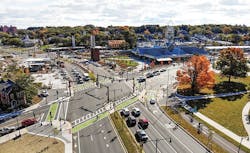NO. 2: Casey Arborway
HNTB served as lead designer for the Massachusetts Department of Transportation’s (MassDOT) transformational Casey Arborway Project.
This project has literally changed the landscape of the Jamaica Plain neighborhood in Boston. The project included the demolition of the structurally deficient Monsignor William J. Casey Overpass and Massachusetts Bay Transportation Authority’s (MBTA) Forest Hills Station upper busway canopy, north headhouse and vent structure, as well as the construction of an at-grade parkway system, expanded transit hub for bus and subway access, and new facilities for pedestrians and bicycles.
The project improved safety and mobility, incorporating the multimodal mobility and livability measures defined during the year-long planning study. Intensive public and stakeholder coordination, along with inventive solutions for overcoming engineering and social challenges, led to an inclusive design that improved and enhanced the surface street network.
The Jamaica Plain neighborhood of Boston has a strong history of public activism including strong engagement in environmental justice and climate change. The Casey Arborway project generated intense public attention due to the significant number of travelers that use this area via a wide range of modes and also because it was an opportunity for transportation infrastructure to transform a neighborhood.
“Knowing the community and the project’s potential, MassDOT and HNTB proactively developed a working advisory group that required public participants to fully engage with the project team through workshops, meetings, and feedback requirements,” said Jonathan Kapust, project manager for HNTB. “This public engagement allowed the project team the opportunity to discuss every aspect of the complex project with the people that live, work, and play in the project area.”
The preliminary public outreach process included more than 21 working group meetings, six public meetings, five open house events, and numerous stakeholder briefings. The results were clear from the very onset, according to Kapust. Participating stakeholders bought in fully and made drawings of their desired lines based on the modes of travel, took photos and found other projects that had design aspects they wanted to see included, and even presented their ideas to MassDOT.
This resulted in a new at-grade street and parkway system that reconnects the historic Frederick Law Olmsted-designed Emerald Necklace park system while modernizing the original concept of separating modes with planted medians, and neighborhood roadways, paths, parks, and transit are neatly integrated into the community.
The project also included the reconstruction of 12 intersections, construction of a fully accessible north headhouse at the MBTA Forest Hills Orange Line subway station, reconstruction of the MBTA upper busway canopy, and construction of the busway extension structure and replacement of the MBTA Orange Line tunnel emergency ventilation system.
Four miles of sidewalks and paths were expanded and widened, with improved pedestrian desire lines and accessibility. Three miles of new off-street bicycle paths were added, as well as innovative intersection treatments, such as a “bike-about,” one of the first bicycle-only, mini-roundabouts constructed in the U.S. and the first in the northeast. The new bicycle infrastructure connecting the Southwest Corridor Park paths to the Arboretum and Franklin Park removed a critical gap in bicycle infrastructure.
This keystone project of MassDOT’s Accelerated Bridge Program—a $3 billion fund set up to address the declining state of the Commonwealth’s bridge infrastructure—fulfilled its project purpose and duties by removing a structurally deficient bridge. This program has led to subsequent projects that have further enhanced the area, including the priority bus lane on Washington Street and installation of Blue Bikes at Forest Hills Station, as well as three large multiuse building redevelopments that abut the project.
Casey Arborway is a signature example of MassDOT’s prioritization of transportation benefits for all travel modes—focusing on moving people, not just vehicles.
